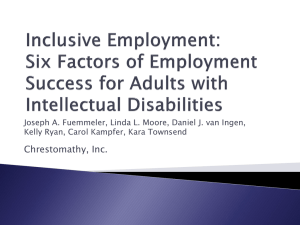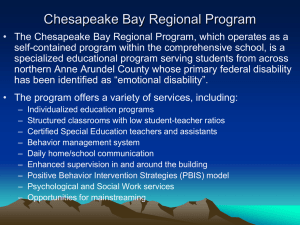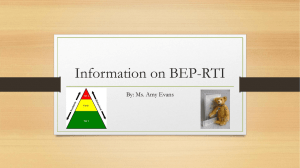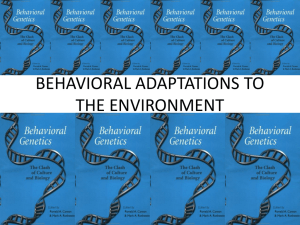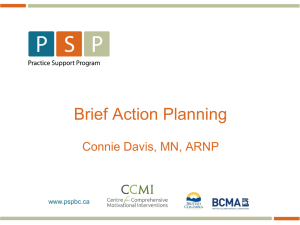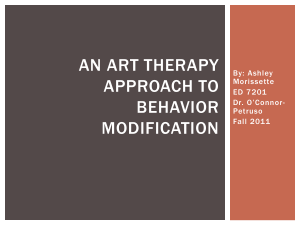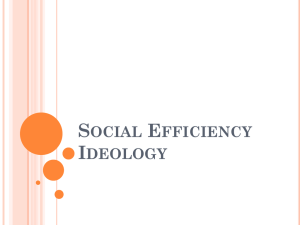Teaching Behavioral Skills - University of Nebraska Medical Center
advertisement
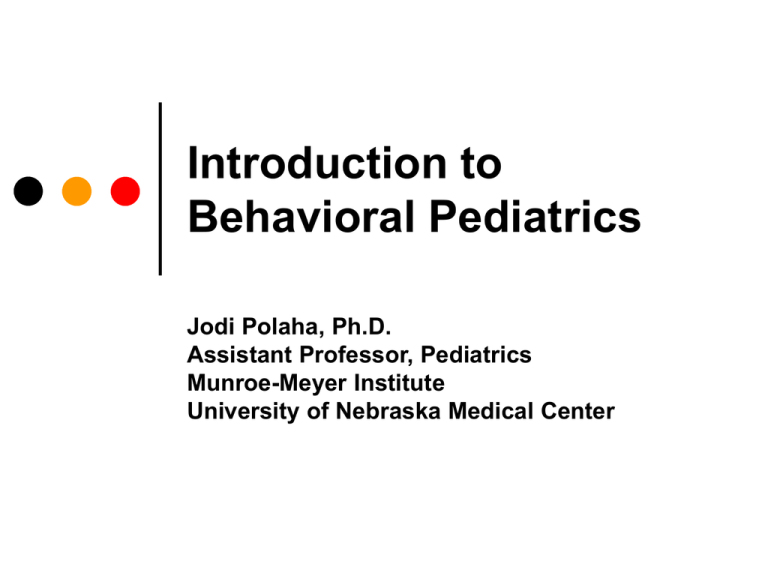
Introduction to Behavioral Pediatrics Jodi Polaha, Ph.D. Assistant Professor, Pediatrics Munroe-Meyer Institute University of Nebraska Medical Center Overview of this class • • • • Goals Use of class time Expectations Questions Overview of today • Behavioral pediatrics • Definition • History • Models • The theory behind a behavioral approach • Definition • “Three essentials” for teaching behavioral skills • Assessment of function What is Behavioral Pediatrics? What is Behavioral Pediatrics? • Field of psychology representing interface between behavioral health care and pediatric primary care. Behavioral Health Pediatric Psychology & Behavioral Pediatrics Medical Health What is Behavioral Pediatrics? • Pediatrics • Emerged in late 1800s. • Concerned with infection, mortality. • Grew to identified specialty in 1930s. • Focus on public policy for children. What is Behavioral Pediatrics? • Clinical Psychology • First clinic in 1899. • First documented collaboration with pediatrics in 1930. • First call to collaboration in 1965. What is Behavioral Pediatrics? • Developmental and Behavioral Pediatrics • 1967, 1975 incorporate child development training into pediatric practice. • 1968 Society of Pediatric Psychology • 1980s Society for Developmental and Behavioral Pediatrics Collaboration with Primary Care Collaboration with Primary Care Why primary care? • Physicians are “de facto” mental health service providers (deGruy, 1997) Collaboration with Primary Care Why primary care? • Physicians are “de facto” mental health service providers (deGruy, 1997) • #1 presenting problem in PC: behavior problems Collaboration with Primary Care Why primary care? • Physicians are “de facto” mental health service providers (deGruy, 1997) • #1 presenting problem in PC: behavior problems • Increased continuity of care Collaboration with Primary Care Why primary care? • Physicians are “de facto” mental health service providers (deGruy, 1997) • #1 presenting problem in PC: behavior problems • Increased continuity of care • De-stigmatizes mental health services Collaboration with Primary Care Why primary care? • Physicians are “de facto” mental health service providers (deGruy, 1997) • #1 presenting problem in PC: behavior problems • Increased continuity of care • De-stigmatizes mental health services • Increased confidentiality Collaboration with Primary Care Models (Drotar, 1995) • Independent Functions Collaboration with Primary Care Models (Drotar, 1995) • Independent Functions • Indirect Consultation Collaboration with Primary Care Models (Drotar, 1995) • Independent Functions • Indirect Consultation • Collaborative Team Collaboration with Primary Care Models of Collaboration (Drotar, 1995) • Independent Functions • Indirect Consultation • Collaborative Team • Systems Approach The Theory Behind a Behavioral Approach • The Behavioral Approach Defined • “Three Essentials” for Teaching Behavioral Skills • Assessment of Problem Behavior: Looking at Function The Behavioral Approach Defined The Behavioral Approach Defined Three Important Underlying Concepts: 1. Behavior is driven by the environment in which it occurs. The Behavioral Approach Defined Three Important Underlying Concepts: 1. Behavior is driven by the environment in which it occurs. 2. Increasing appropriate behavior is as important as decreasing problem behavior. The Behavioral Approach Defined Three Important Underlying Concepts: 1. 2. 3. Behavior is driven by the environment in which it occurs. Increasing appropriate behavior is as important as decreasing problem behavior. Focus is on observable, measurable outcomes. Teaching Behavioral Skills Teaching Behavioral Skills • What are behavioral skills? • Behaviors that society expects. Teaching Behavioral Skills • What are behavioral skills? • Behaviors that society expects. • Behaviors that facilitate good relationships. Teaching Behavioral Skills • What are behavioral skills? • Behaviors meeting societal expectations • Behaviors facilitating good relationships • Prerequisites for learning any other skill Teaching Behavioral Skills • Birth through toddler years: • Independent sleep • Self-quieting • Independent play Teaching Behavioral Skills • Preschool Years: • Beginning anger management • Following one-step instructions • Following simple long-term and shortterm rules • Waiting one’s turn • Sharing and parallel play Teaching Behavioral Skills • Elementary Years: • Advanced anger management • Following increasingly complex instructions • Following multiple and complex longterm and short-term rules • Cooperation in group activities Teaching Behavioral Skills • Adolescence • Persistence in working toward longterm objectives • Problem-solving • Increased emotional management • Negotiating Teaching Behavioral Skills The Three Essentials: 1. Predictability Teaching Behavioral Skills The Three Essentials: 1. Predictability • • In your daily structure In the consequences you provide Teaching Behavioral Skills The Three Essentials: 1. Predictability 2. Practice Teaching Behavioral Skills The Three Essentials: 1. Predictability 2. Practice • • • Break the new skill down Give lots of opportunities to try it Provide predictable feedback Teaching Behavioral Skills The Three Essentials: 1. Predictability 2. Practice 3. “Big Difference” Teaching Behavioral Skills Creating a “Big Difference” Your consequence for demonstrating a skill appropriately should be VERY DIFFERENT than your consequence for demonstrating a problem behavior. Teaching Behavioral Skills HUGE! Mom’s Reaction 100 80 60 40 20 none 0 Quiet Gagging BABY LEARNS TO GAG Teaching Behavioral Skills HUGE! Mom’s Reaction 1 0.8 0.6 0.4 0.2 none 0 Quiet Gagging IGNORING:BABY LEARNS NOTHING Teaching Behavioral Skills HUGE! Mom’s Reaction 100 80 60 40 20 none 0 Quiet Gagging BABY LEARNS TO QUIET Teaching Behavioral Skills • Generating an “effect” in the environment can be very reinforcing. Teaching Behavioral Skills • Generating an “effect” in the environment can be very reinforcing. Touch, Talk, and Look are all effects. Teaching Behavioral Skills • Problem #1: • Not enough of a reaction for using the skill appropriately. Teaching Behavioral Skills • Problem #1: • Not enough of a reaction for using the skill appropriately. Teaching Behavioral Skills 1 0.8 0.6 0.4 0.2 0 Quiet NO LEARNING Gagging Teaching Behavioral Skills Your Reaction 100 80 60 40 20 0 SKILL! Problem Behavior WHAT ARE YOU DOING WHEN YOU SEE THE SKILL? Teaching Behavioral Skills 1. Frequent, brief, “bursts” of attention for AVERAGE behavior. Teaching Behavioral Skills 1. Frequent, brief, “bursts” of attention for AVERAGE behavior. 2. BIG REACTION for demonstrating the skill. Teaching Behavioral Skills 1. Frequent, brief, “bursts” of attention for AVERAGE behavior. 2. BIG REACTION for demonstrating the skill. 3. Play the Child’s Game Teaching Behavioral Skills • The Child’s Game: A relationship-building activity that makes children want to earn your POSITIVE attention. Teaching Behavioral Skills • DO • Describe • Praise • Touch • DON’T • Command • Reprimand • Question Teaching Behavioral Skills • Problem #1: • Not enough of a reaction for using the skill appropriately. • Problem #2: • Too much reaction for problem behaviors. Teaching Behavioral Skills 100 80 60 40 20 0 SKILL! NO LEARNING Problem Behavior Teaching Behavioral Skills • Solution: • Use Less Talk! Teaching Behavioral Skills • Why not talk? • Child may not understand. Teaching Behavioral Skills • Why not talk? • Child may not understand. • Understanding doesn’t mean the child will change behavior, anyway. Teaching Behavioral Skills • Why not talk? • Child may not understand. • Understanding doesn’t mean the child will change behavior. • Experience is a better teacher. Teaching Behavioral Skills • Why not talk? • Child may not understand. • Understanding doesn’t mean the child will change behavior. • Experience is a better teacher. • Child needs to learn to perform the skill independently. Teaching Behavioral Skills • Why not talk? • Child may not understand. • Understanding doesn’t mean the child will change behavior. • Experience is a better teacher. • Child needs to learn to perform the skill independently. • Leads to arguing. Teaching Behavioral Skills • Why not talk? • Child may not understand. • Understanding doesn’t mean the child will change behavior. • Experience is a better teacher. • Child needs to learn to perform the skill independently. • Leads to arguing. • Talking creates a motivating “effect.” Teaching Behavioral Skills • The Three Essentials: 1. Consistency 2. Repetition 3. High Contrast Teaching Behavioral Skills • The Three Essentials: 1. Consistency 2. Repetition 3. High Contrast ….well, sort of… Assessment of Problem Behavior: Looking at Function Three Functions: 1. To Get Something Assessment of Problem Behavior: Looking at Function Three Functions: 1. To Get Something 2. To Get Out of Something (Escape) Assessment of Problem Behavior: Looking at Function Three Functions: 1. To Get Something 2. To Get Out of Something (Escape) 3. Self-Stimulation
